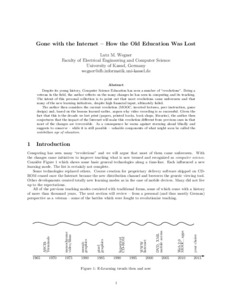Gone with the internet - How the old education was lost
| dc.date.accessioned | 2015-04-08T07:41:11Z | |
| dc.date.available | 2015-04-08T07:41:11Z | |
| dc.date.issued | 2015-04-08 | |
| dc.identifier.uri | urn:nbn:de:hebis:34-2015040848057 | |
| dc.identifier.uri | http://hdl.handle.net/123456789/2015040848057 | |
| dc.language.iso | eng | |
| dc.rights | Urheberrechtlich geschützt | |
| dc.rights.uri | https://rightsstatements.org/page/InC/1.0/ | |
| dc.subject | Internet use | ger |
| dc.subject.ddc | 004 | |
| dc.title | Gone with the internet - How the old education was lost | ger |
| dc.type | Aufsatz | |
| dcterms.abstract | Despite its young history, Computer Science Education has seen a number of "revolutions". Being a veteran in the field, the author reflects on the many changes he has seen in computing and its teaching. The intent of this personal collection is to point out that most revolutions came unforeseen and that many of the new learning initiatives, despite high financial input, ultimately failed. The author then considers the current revolution (MOOC, inverted lectures, peer instruction, game design) and, based on the lessons learned earlier, argues why video recording is so successful. Given the fact that this is the decade we lost print (papers, printed books, book shops, libraries), the author then conjectures that the impact of the Internet will make this revolution different from previous ones in that most of the changes are irreversible. As a consequence he warns against storming ahead blindly and suggests to conserve - while it is still possible - valuable components of what might soon be called the antebellum age of education. | ger |
| dcterms.accessRights | open access | |
| dcterms.creator | Wegner, Lutz M. | |
| dc.subject.swd | E-Learning | ger |
| dc.subject.swd | Nutzung | ger |
Dateien zu dieser Ressource
Das Dokument erscheint in:
-
Publikationen [18]

